challenged BE



At Boston University Academy, high school students who love learning are challenged to think critically and read deeply, and to explore adventurously the wider world of learning on the campus of a global research university.
Boston University Academy’s academic program pairs a liberal arts core high school curriculum with courses at Boston University. It’s an optimal blend of small classes and individualized teacher attention at BUA and the vast educational resources available through BU. Students’ zeal for learning can take them as far as they are capable: there are no limits to learning at BUA.
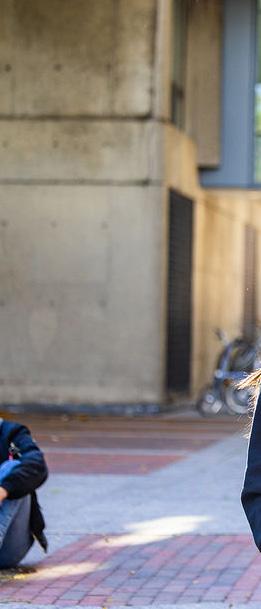
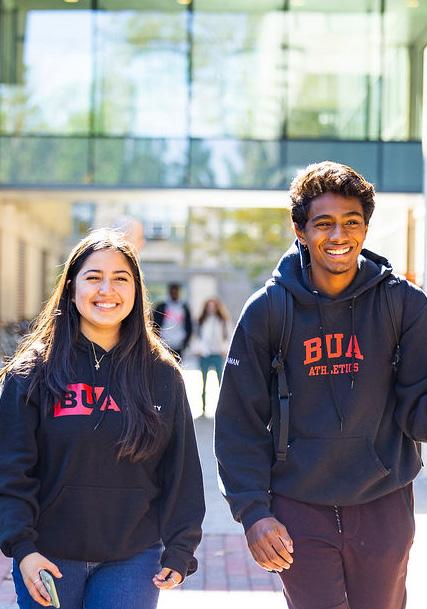
The BUA curriculum — the only one of its kind in New England — enables students to gain exposure to new disciplines and to pursue their particular interests at advanced levels. It is a program built for students’ growth as thinkers and as individuals. By design, the curriculum evolves to provide an appropriate level of challenge and support for each grade level, preparing students for the myriad of opportunities offered at BU in their junior and senior years. Boston University Academy’s program is mindful of each student’s unique interests and needs.
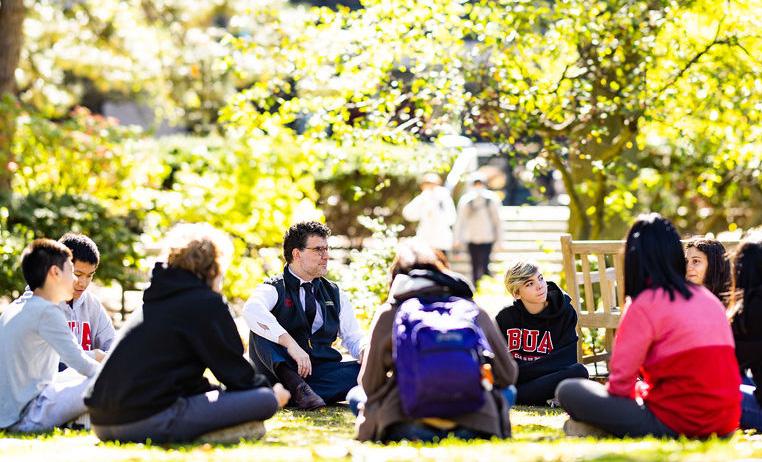
Boston University Academy classes are all honors level. Every student gains a solid foundation in the humanities—English, history, and language. Ninth and tenth graders also study biology and chemistry, a visual or performing art, and the level of mathematics they are prepared for, from advanced algebra to multivariate calculus and beyond. BUA’s core curriculum prepares students for in-depth study of just about anything.
While ninth- and tenth-grade students follow a classically-based, globally focused liberal arts curriculum, eleventh and twelfth graders have the freedom to choose from more than 2,000 classes from Boston University’s course catalog. In their BU courses, eleventh- and twelfth-grade students build upon their underclassmen experience to pursue their individual interests at advanced levels.
Liberal arts curriculum that includes English, history, science, mathematics, classical language, the arts, and physical education
Two-year study of Latin or ancient Greek; tenth graders who test into the third semester of a modern language may choose to take that course at BU instead of the second year of classical language
Elective modern language courses offered online through Middlebury Interactive Languages in 9th and 10th grades
Ninth- and Tenth-Grade Seminars, courses on issues of relevance to today's teenagers (more info on p. 9) Interdisciplinary approach to humanities through immersion in the classic works of Western civilization in conversation with global texts and with emphasis on close reading and writing
A shared academic experience to support study across a wide variety of disciplines in eleventh and twelfth grades
The BUA approach prompts students to understand historical perspectives, to think critically and delve deeply, to master the use of primary texts, and to hone their interpretive skills. BUA students learn to question what they read, to craft a well-reasoned argument, and to appreciate the connections between literature, history, philosophy, religion, science, and political theory. Classes focus on the debate of “why” and “how.”
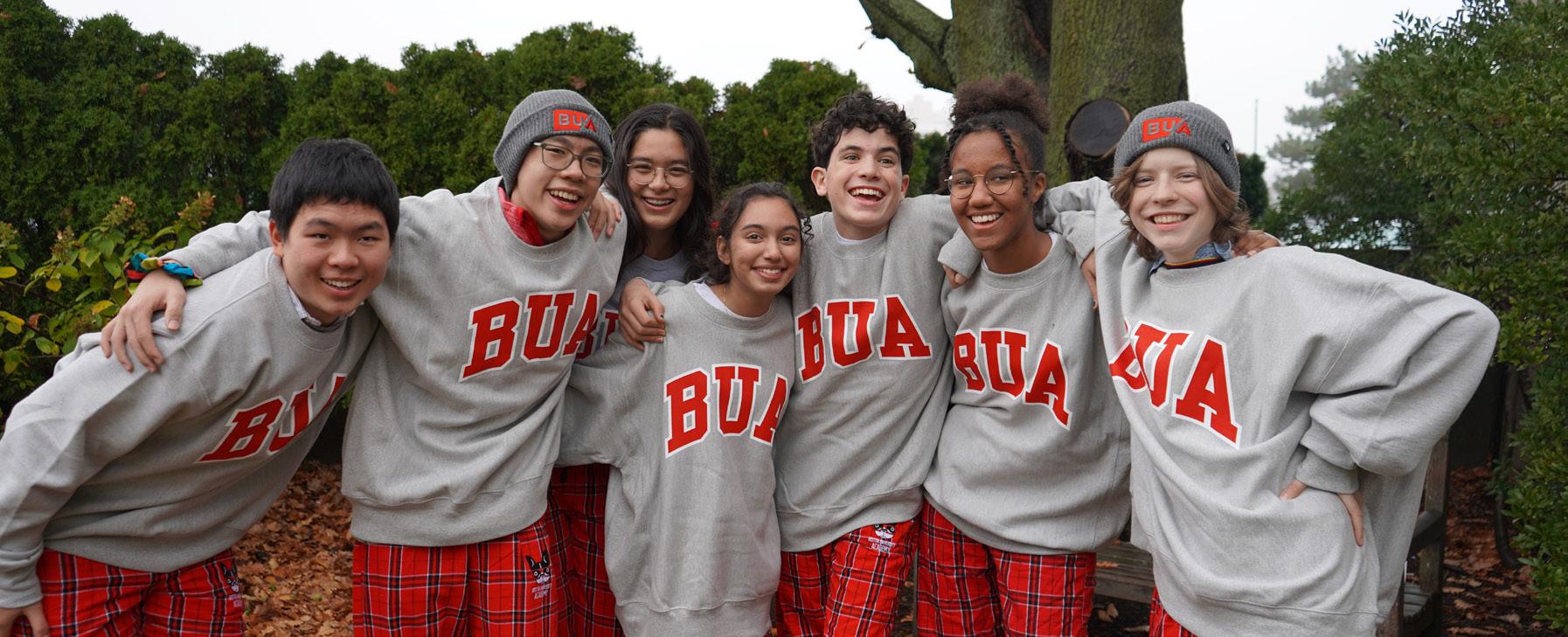
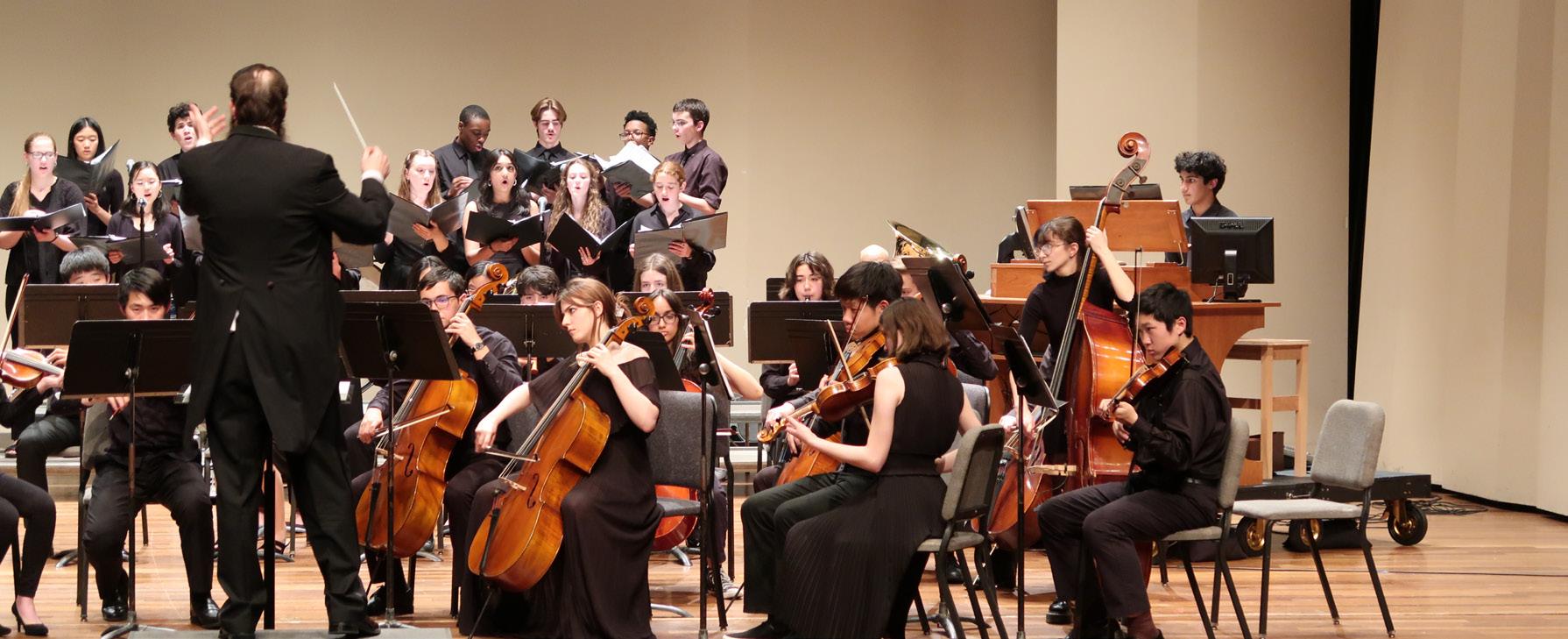
All eleventh and twelfth graders enroll in courses at BUA and BU; juniors typically take two courses a semester at the University, while seniors can take as many as four courses a semester at BU
Students can pick from over 2,000 BU courses including 27 modern languages
All University courses are taken for credit with Boston University faculty and students; most students earn as many as 48 college credits (the equivalent of 12 college courses or 1 ½ years) prior to graduating
Course credits may be transferred at the discretion of the college at which a student matriculates
Most students graduate with proficiency in two languages: one classical and one modern (students often achieve in two years the equivalent of four years of high school language study)
All students must complete calculus by the end of their senior year
Most juniors enroll in Biology 107 and Biology 108, completing the science sequence that began with physics and chemistry at BUA, and a modern language at the University
All seniors complete a year-long thesis project under the guidance of a University professor and a BUA faculty advisor
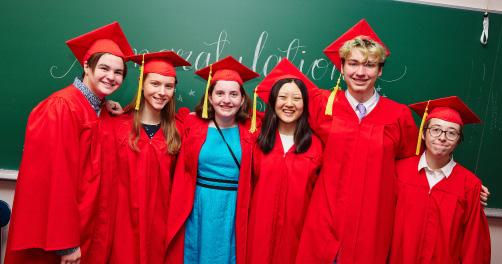
The non-shaded areas represent required coursework, while the shaded boxes represent elective options.
ENGLISH The Literary Canon in Conversation: Self in Society
LANGUAGE
MATH
British Literature: Global Citizenship Senior Seminar at BUA or an English course at BU
American Literature: Identity and Belonging
Power and Wisdom in the Ancient World Makings of the Modern World United States History
27 modern languages offered at BU; placement is determined by exam (not grade level)
Typical course progression: Advanced Algebra, Geometry, Precalculus, Calculus I, Calculus II, and Multivariate Calculus. Placement is determined by ability and exposure, not grade level; completion of Calculus I is a graduation requirement. Students can take up to Multivariate Calculus at BUA, after which higher level math courses are available at BU.
Chamber Ensemble, Chorus, Jazz Band, Drama or Visual Art
Ninth-Grade
Ninth- and Tenth-Grade Seminars — required
The Ninth- and Tenth-Grade Seminars are opportunities for fun, hands-on learning without the added pressures of grades or homework. These courses meet once per week, and rotate through various topics of study: Health & Wellness; Cultural Competency; Computer Science; Design Thinking at the BU Innovate and BUild Lab; Engineering at BU's Engineering Product Innovation Center (EPIC); and Foundations in Language and Logic. These themes were chosen based on their broad applicability to adolescents and their importance in preparing students for their futures as responsible, productive citizens in society.
Modern Language Program — elective for 9th and 10th graders; by application
This full-credit elective program enables underclassmen to study a modern language alongside the five full-credit course load. There are two ways in which ninth and tenth graders can study a modern language: the first is an online program through Middlebury Interactive Languages; the second is advanced modern language study at BU for those tenth graders who demonstrate proficiency equivalent to two years of high school language (by placing into a third semester language course at BU).
Tenth-Grade Seminar
Advanced seminars available at BUA and BU
Physical Education — required of all 9th and 10th graders
BUA’s physical education program utilizes BU’s extraordinary athletic facilities and program offerings. Students in ninth and tenth grade can choose from over two dozen PE electives to fulfill this requirement. Upperclassmen may choose to use any of the fitness equipment; weight rooms; multipurpose fitness studios; aquatic facilities; and squash, racquetball, and basketball courts housed within BU’s 270,000-squarefoot Fitness and Recreation Center (FitRec).
Junior Research Seminars — optional ½ credit elective for 11th graders
Juniors with defined academic interests may enroll in one of two optional, honors-level seminars. These ½ credit electives provide students with skills in research methodology, and introduce students to University faculty and research being undertaken at Boston University. For many students, these seminars become the basis for their Senior Thesis.
Students tour various laboratories and examine current science periodicals; many students opt to conclude the course by participating in summer research internships.
Program Highlights
History, Arts, and Letters (HAL) optional
½ credit elective for 11th graders
Students examine research methods in the humanities and social sciences, including how to navigate the myriad of University resources in developing research papers.
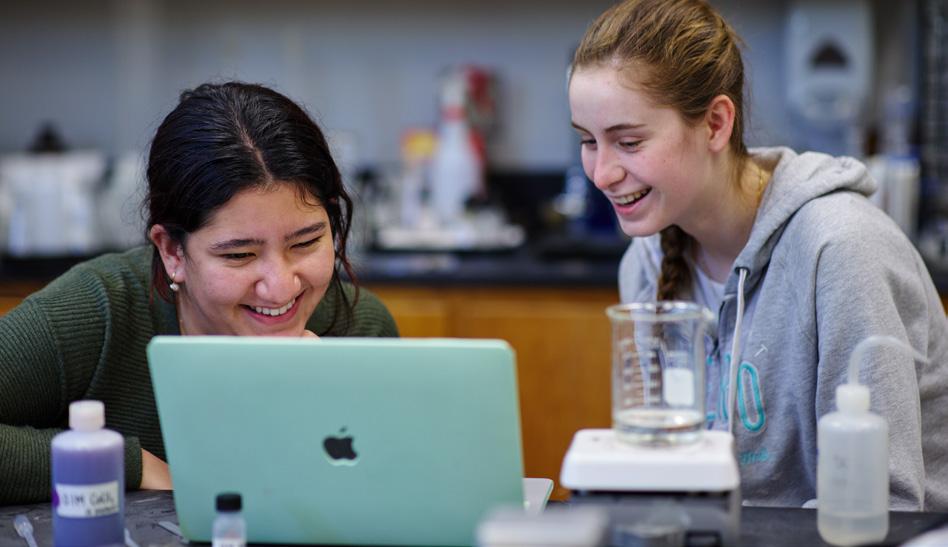
Advanced Art Seminars — ½ credit elective for 11th and 12th graders
Topics for these year-long electives vary from year to year; recent offerings have included: Independent Study in 2D Design, Shakespeare Study, Music Theory, and Musicianship.
Senior Thesis — required coursework for all 12th graders
A culminating BUA experience, this year-long project provides students with the opportunity to follow an intellectual passion in depth with the guidance of a university professor and BUA faculty advisor.
Educating and supporting the whole student is a fundamental part of our philosophy at BUA.
The Health & Wellness unit offers engaging lessons on physical and emotional health and wellbeing with special attention to topics of relevance to today’s teenagers, including nutrition; mental health; sexual health; social interactions; and social media and technology use.
It is critical that BUA students learn to be thoughtful, informed, and culturally competent citizens in an increasingly diverse world. The Cultural Competency unit provides a chance to discover our common humanity through active, experiential workshops exploring identity, empathy, stereotypes and bias, and the eight core cultural identifiers.
Computer Science has broad application in today’s job market, and is a key life skill no matter what field of study one chooses to pursue. Students learn the fundamentals of Computer Science through interactive lessons in coding (using Python) and other basics.
BU's Engineering Product Innovation Center (EPIC) hosts technology clinics where students are introduced to hand tools, laser cutting, waterjet cutting, and 3D printing.
In the BU Innovate and BUild Lab, students learn to apply design thinking skills to real-world problems.
Foundations in Language and Logic introduces students to concepts of writtten argument and style. This unit aims to develop an early awareness in students of words as both fun and powerful, and of the ways in which language and logic are working on us every waking hour.
All-School Meeting (ASM) takes place every Tuesday morning during the academic year and is an essential part of the BUA program. It is a time for the BUA community to come together to learn, to share news and announcements, and to discuss important issues facing our school and society at large. These weekly gatherings often include talks given by BU professors, visiting scholars, or BUA faculty on their areas of expertise.
Academic Block provides opportunities for students to get a jump-start on homework and to seek out support from teachers and tutors. Academic Blocks are quiet, proctored hours carved out of the school day for all underclassmen. Advising and Student Support takes on many forms at BUA. Every student is paired with an advisor who supports and encourages that student’s academic and social-emotional wellbeing. Ninth- and tenth-grade students meet with their advisor and advising group three times per week. Class advisors coordinate weekly grade-wide meetings that focus on community norms, adjusting to life at BUA, as well as student health and wellness. The BUA Student Support team also includes the school counselor, learning specialist, and the University liaison who serves as a conduit of communication between BUA and BU instructors.
Student Clubs and Activities provide meaningful ways for students to pursue non-academic interests, enjoy creative outlets, reduce stress, and build community. With more than 50 clubs and 15 interscholastic and recreational sports to choose from, there are more extracurricular opportunities than there are hours in a day!
BUA’s connection to Boston University opens all kinds of doors for our curious and motivated students. BU’s resources are our resources, including cutting edge-learning and athletic facilities, an expansive course catalog, and distinguished faculty.

When it comes time to choose courses at the University, there are over 2,000 available to BUA students. From Stellar and Galactic Astrophysics to the History of Piracy, Philosophy and Film to Foundations of Data Science, if a student is passionate about something, they will be able to pursue it. The active partnership we maintain with Boston University offers one-of-a-kind possibilities: BUA students have the opportunity to gain exposure to new disciplines as well as to follow their passions and pursue particular interests at advanced levels. All University courses are taken with Boston University faculty and students.
Because we’re part of a major research university, BUA students utilize resources that other high schoolers can only dream of. Our unrivaled access to Boston University’s professional laboratories and research facilities allows BUA students interested in STEM to explore their interests in actual—not virtual—reality.
BUA students have more than 2.4 million physical volumes and 77,000 media titles available to them through BU’s library system. In addition to books, BU Libraries provide limitless search tools, access to databases and global resources, research materials
and tutorials, and specialty subject research guides developed in-house by librarian experts.
Students enjoy access to University resources both inside and out of the classroom. Our physical education classes take place at BU’s 270,000-square-foot Fitness & Recreation Center (FitRec), where students choose from more than 25 physical education electives. Students 16 and older are also able to work out independently at FitRec, where they have access to weight rooms; multipurpose fitness studios; aquatic facilities; and squash, racquetball, and basketball courts.
BUA’s 15 interscholastic and recreational sports also utilize BU’s world-class athletic facilities, from Nickerson Field for soccer, to sailing and rowing out of the DeWolfe Boathouse.
BUA students can opt to buy lunch from over a dozen options in BU’s George Sherman Union (GSU) next door — not your average high school cafeteria. Choices include sushi, fresh salads, global street food, gourmet sandwiches, and much more. Ninth and tenth graders eat in a reserved dining room, while eleventh and twelfth graders can explore the restaurants and cafes along Commonwealth Avenue.
All BUA students in good academic and disciplinary standing are ensured admission to most of BU’s four-year undergraduate programs with a financial aid package that meets 100% of their calculated need.
Imagine going into the competitive college application process with the certainty that you will be admitted to one of the nation’s top research universities. Of all our peer schools, Boston University Academy alone is able to offer this assurance to our students.
Boston University employees may be eligible to apply their tuition remission benefit toward a portion of their child’s tuition at Boston University Academy. Because seniors at BUA take the majority of their coursework at the University, BU allows employees to participate in the tuition remission program during this year. University families who enroll at BUA may also apply for need-based financial aid to assist in the cost of tuition for all four years.
Boston University Academy students must complete an application and submit all required testing in full if they wish to be considered for admission to BU. BUA students who apply to BU will be granted admission to most of BU’s undergraduate 4-year programs if they meet the following criteria:
Earn a 3.0 cumulative GPA in Academy and University coursework by the time of application
Have no grade of D or F in any BUA or University course(s)
Have no reportable disciplinary infraction(s)
In eleventh and twelfth grade, students regularly complete up to 12 courses (equivalent to approximately 48 college credits) from the University’s undergraduate curriculum. These credits represent a value of $91,575, based on the current undergraduate tuition cost at BU, and thereby potentially minimize future college tuition costs.
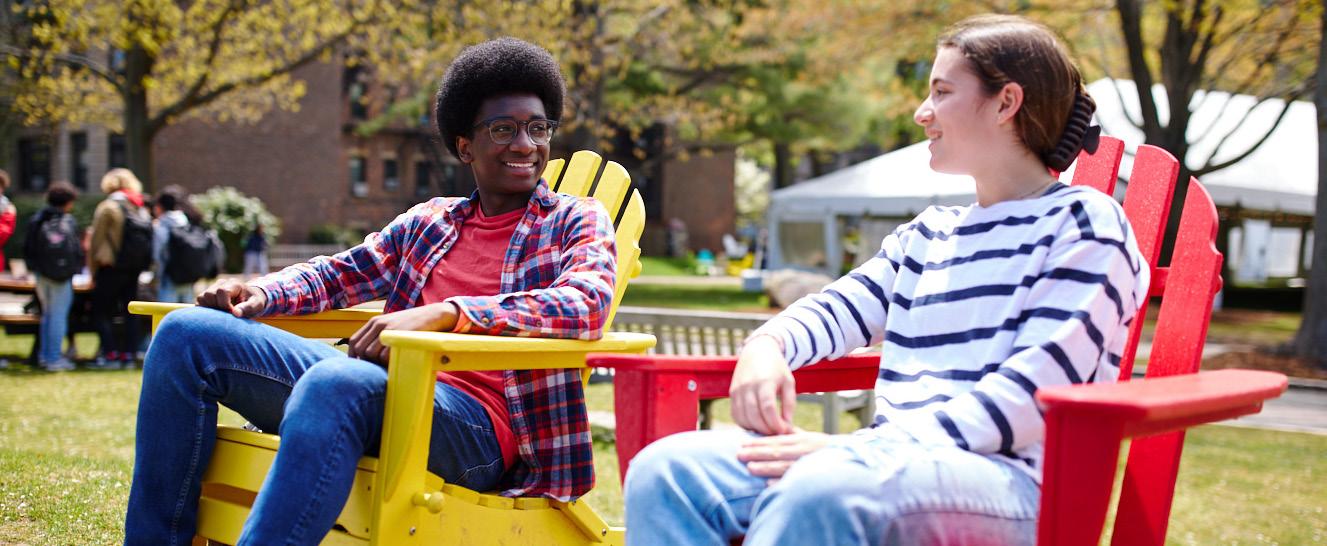
are
BOSTON UNIVERSITY ACADEMY STUDENTS HAVE ENROLLED IN A COMBINED
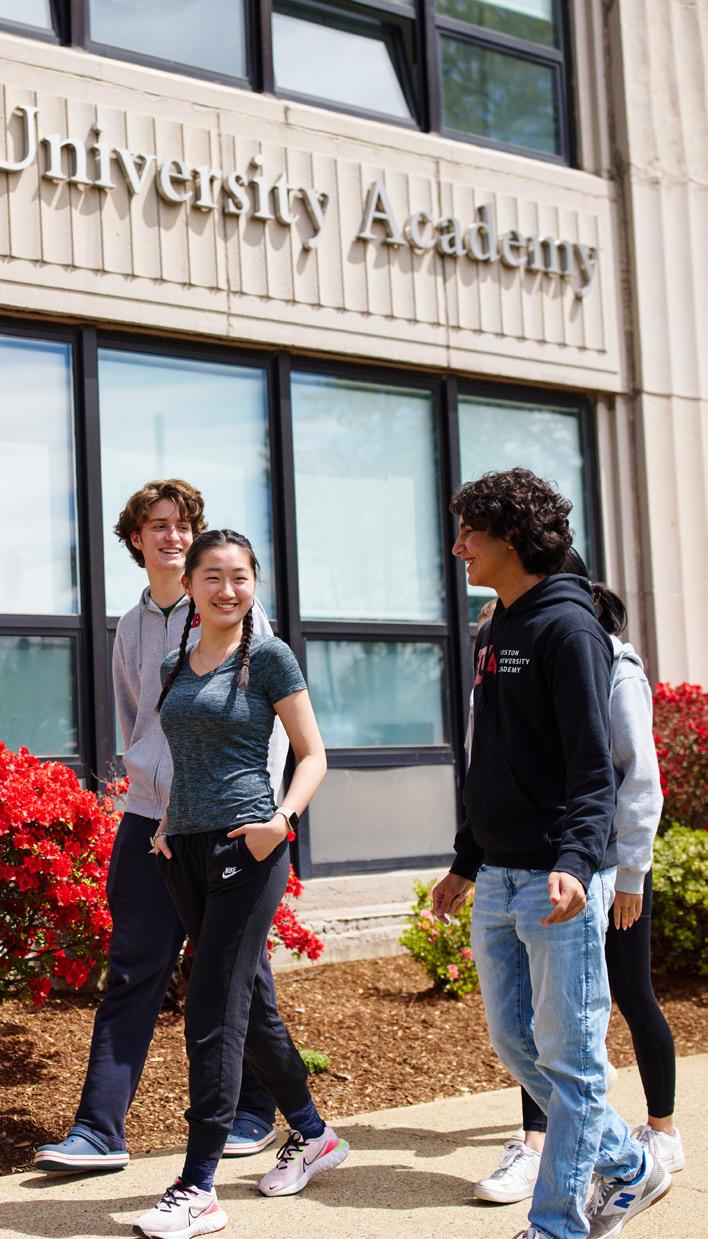
2,689
CLASSES AT BOSTON UNIVERSITY
This figure represents an impressive across DEPARTMENTS & INTERDISCIPLINARY PROGRAMS
DISTINCT COURSES
— BU Professor
“
I have always enjoyed having BUA students in my classes. They
very well prepared and motivated to learn. I would say that they often push other students to up their game.
The following is a complete list of the Boston University courses that BUA students enrolled in during the 2022–2023 academic year. Most students take as many as two University courses a semester as juniors and up to four classes a semester during senior year. BUA graduates are likely to have completed up to 12 courses for 48 college credits, some of which may be transferable to their selected college. All University courses are taken with Boston University faculty and students. Students graduate with transcripts from Boston University Academy and from Boston University.
The following are courses taken in BU’s College of Arts and Sciences
Anthropology
CAS AN 102 Human Behavioral Biology & Evolution
CAS AN 210 Medical Anthropology
CAS AN 260 Sex and Gender in Anthropological Perspective
CAS AN 263 Behavioral Biology of Women
CAS AN 290 Anthropology: Children and Culture
Archaeology
CAS AR 100 Great Discoveries in Archaeology
Art History
CAS AAH 112 Art History II
Astronomy
CAS AS 101 The Solar System
CAS AS 102 The Astronomical Universe
CAS AS 105 Alien Worlds
CAS AS 202 Principles of Astronomy I
Biology
CAS BI 107 Biology I
CAS BI 108 Biology II
CAS BI 203 Cell Biology
CAS BI 206 Genetics
CAS BI 210 Human Anatomy
CAS BI 211 Human Physiology
CAS BI 216 Intensive Genetics
CAS BI 260 Marine Biology
CAS BI 303 Evolutionary Ecology
CAS BI 306 Biology of Global Change
CAS BI 309 Evolution
CAS BI 315 Systems Physiology
Chemistry
CAS CH 204 Organic Chemistry II
CAS CH 211 Intensive Organic Chemistry I
CAS CH 212 Intensive Organic Chemistry II
CAS CH 232 Inorganic Chemistry
CAS CH 351 Physical Chemistry I
CAS CH 352 Physical Chemistry II
CAS CH 541 Natural Products Chemistry
Cinema & Media Studies
CAS CI 102 Global Cinema II
CAS CI 268 Religion and Film
CAS CI 390 Special Topics in Cinema and Media Studies
Classical Studies
CAS CL 102
Classical Civilization of Rome
CAS CL 351 Latin Seminar
CAS CL 391
CAS CL 451
Greek Seminar: Thucydides
Advanced Latin Seminar
CAS CL 530 Latin Prose Composition
Computer Science
CAS CS 101
CAS CS 103
Introduction to Computers
Intro to Internet Technologies and Web Programming
CAS CS 105 Databases
CAS CS 108
Introduction to Applications Programming
CAS CS 111 Intro Computer Science I
CAS CS 112
Introduction to Computer Science II
CAS CS 131 Combinatoric Structures
CAS CS 132 Geometric Algorithms
CAS CS 210 Computer Systems
CAS CS 330
Introduction to Analysis of Algorithms
CAS CS 332 Elements of the Theory of Computation
CAS CS 410
Advanced Software Systems
Earth and Environment
CAS EE 105 Crises of Planet Earth
CAS EE 107
CAS EE 144
Intro to Climate and Earth System Science
Introduction to Oceanography
CAS EE 150 Sustainable Energy: Tech, Resources, Society, and Environment
Economics
CAS EC 101
CAS EC 102
CAS EC 202
Introductory Microeconomic Analysis
Introductory Macroeconomic Analysis
Intermediate Macroeconomics
CAS EC 203 Empirical Economics I
CAS EC 348 Dynamic Macroeconomics
CAS EC 356 Economics of the Labor Market
English
CAS EN 122 Medieval Worlds
CAS EN 125 Readings in Modern Literature
CAS EN 127 Readings in American Literature I
CAS EN 130 Science/Fiction
CAS EN 142 Introduction to Poetry
CAS EN 163 Readings in Shakespeare
CAS EN 170 The Graphic Novel
CAS EN 176 Introduction to Film and Media Aesthetics
CAS EN 177 Asian American Literature
CAS EN 180 Post-Apocalyptic Narratives
CAS EN 195 Literature and Ideas
CAS EN 202 Introduction to Creative Writing
CAS EN 220 Seminar in Literature
Earth Sciences
CAS ES 105 Environmental Earth Science
CAS ES 107 Introduction to Climate & Earth System Science
History
CAS HI 190 History of Boston
CAS HI 214 History of Piracy
CAS HI 218 Power and Authority in Europe Since WWI
International Relations
CAS IR 304 Environmentally Sustainable Development
CAS IR 337 Religion and Politics
CAS IR 343 African Politics Today
CAS IR 350 History of International Relations since 1945
CAS IR 354 Gender and Global Politics
CAS IR 374 Introduction to Security Studies
CAS IR 376 American Foreign Policy
CAS IR 517 Balkan Politics and International Relations
CAS IR 542 The Reemergence of Russia
Linguistics
CAS LX 110 Say What? Accents, Dialects, and Society
CAS LX 250 Introduction to Linguistics
Mathematics and Statistics
CAS MA 113 Elementary Statistics
CAS MA 115 Statistics I
CAS MA 116 Statistics II
CAS MA 119 Applied Mathematics for Personal Finance
CAS MA 124 Calculus II
CAS MA 213 Basic Statistics and Probability
CAS MA 214 Applied Statistics
CAS MA 225 Multivariate Calculus
CAS MA 242 Linear Algebra
CAS MA 433 Graph Theory
CAS MA 442 Honors Level Linear Algebra
CAS MA 511 Introduction to Analysis I
CAS MA 531 Mathematical Logic
CAS MA 541 Modern Algebra I
CAS MA 542 Modern Algebra II
CAS MA 581 Probability
Neuroscience
CAS NE 101 Introduction to Neuroscience
CAS NE 102 Introduction to Cellular and Molecular Biology
Philosophy
CAS PH 100 Introduction to Philosophy
CAS PH 159 Philosophy and Film
CAS PH 247 Introduction to Chinese Philosophy
Physics
CAS PY 211 General Physics
CAS PY 351 Modern Physics I
CAS PY 355 Methods of Theoretical Physics
CAS PY 408 Intermediate Mechanics
Psychological & Brain Sciences
CAS PS 101 General Psychology
CAS PS 222 Perception and Behavior
CAS PS 231 Physiological Psychology
CAS PS 261 Social Psychology
CAS PS 333 Drugs and Behavior
CAS PS 371 Abnormal Psychology
Religion
CAS RN 239 Religion and Science
CAS RN 248 Food and Religion
Romance Studies
CAS LF 111 First Semester French
CAS LF 212 Fourth Semester French
CAS LF 307 French Arts and Society
CAS LF 308 French through Film and Media
CAS LF 311 French Popular Culture
CAS LF 313 French through Translation
CAS LF 462 Cinema-Monde: Mapping French Film
CAS LF 571 Topics in Nineteenth-Century French Literature
CAS LI 111 First Semester Italian
CAS LI 112 Second Semester Italian
CAS LS 112 Second Semester Spanish
CAS LS 211 Third Semester Spanish
CAS LS 307 Spanish Literature and Arts
CAS LS 308 Spanish Film & Media
CAS LS 350 Introduction to Analysis of Hispanic Texts
CAS SO 100 Principles in Sociology
CAS SO 205 American Family
CAS SO 215 Sociology of Health Care
CAS SO 225 Law and Society
CAS SO 230 Crime and Justice
CAS SO 240 Sex and Social Life
World Languages and Literatures
CAS LC 111 First Semester Chinese
CAS LC 112 Second Semester Chinese
CAS LC 211 Third Semester Chinese
CAS LC 212 Fourth Semester Chinese
CAS LC 250 Premodern Chinese Literature
CAS LC 311 Third Year Modern Chinese
CAS LC 319 Practical Chinese: Chinese in Intercultural Communications
CAS LC 320 Advanced Classical Chinese
CAS LC 322 Business Chinese
CAS LC 416 Chinese through Literary Masterpieces
CAS LG 111 First Semester German
CAS LG 211 Third Semester German
CAS LG 307 Modern Society and Culture
CAS LG 308 Food Culture in German- Speaking Countries
CAS LG 309 German for the Professions
CAS LG 335 Music, Art, and History in the German Speaking World
CAS LH 111 First Semester Hebrew
CAS LH 311 Advanced Modern Hebrew
CAS LK 116 First Year Korean for Heritage Speakers
CAS LK 212
CAS LK 216
Fourth-Semester Korean
Second-Year Korean for Heritage Speakers
CAS LK 250 Intro Korean Literature
CAS LK 322 Korean for the Professions
CAS LN 111
CAS LN 112
CAS LN 211
Hindi-Urdu
Second-Semester Hindi-Urdu
Third-Semester Hindi-Urdu
CAS LR 250 Classics of Russian Prose
CAS LR 280 Dostoyevsky (in English translation)
Writing Program
CAS WR 120
First-Year Writing Seminar: Corporation in American Culture
CAS WR 150 Writing and Research Seminar
CAS WR 151 Writing, Research, and Inquiry with Oral and/or Signed Expression
CAS WR 152 Writing, Research, & Inquiry w Digital/ Multimedia Expression
The following are courses taken in BU schools and colleges other than the College of Arts and Sciences
Communications
COM CM 180 Understanding Media
COM CO 101 The Human Storyteller
COM JO 205 Visual Storytelling
COM JO 350 Law and Ethics of Journalism
Chemistry
PLB CH 203 Organic Chemistry I Pre-Lab
PLB CH 204 Organic Chemistry II Prelab
Data Sciences
CDS DS 100 Data Speaks Louder Than Words
CDS DS 120 Foundations of Data Science
CDS DS 199 Computing and Data Science Workshop
Engineering
ENG BE 209 Principles of Molecular Cell Biology and Biotechnology
ENG EK 125 Introduction to Programming for Engineers
ENG EK 131 Topics in Engineering
Fine Arts
CFA TH 220 Acting & Performance II
Graduate School of Arts & Sciences
GRS CH 642 Organic Reaction Mechanisms
Physical Development
PDP DA 150 Cardio-Jazz Funk
PDP DA 229 Ballet, Low Intermediate
PDP DA 240 Modern Dance
Sargent College of Health & Rehabilitation Sciences
SAR HS 325 Introduction to Global Health
School of Education
SED AP 526
SED DE 382
SED DE 383
SED DE 384
SED DE 570
Family and Community Engagement
American Sign Language II
American Sign Language III
American Sign Language IV
American Sign Language V
School of Hospitality Administration
SHA HF 100
Introduction to Hospitality
School of Theology
STH TN 816
STH TN 817
Greek Reading I
Greek Reading II
Questrom School of Business
QST IS 223
QST SM 275
Introduction to Information Systems
Management Communications
Being a part of a major research university means BUA students utilize resources that other high schoolers can only dream about. Our Junior Research Seminar exposes students to research at Boston University and provides students with the opportunity to begin initial research on their thesis work.
University professors share their approach to research, and students learn how to effectively initiate a research project, including using a variety of libraries, web-based resources, and bibliographies.
Students gain insight into scientific research by taking weekly tours of Boston University’s laboratories and examining current science periodicals during the fall and winter. In the spring, tours are replaced with laboratory rotations, which often develop into summer internships. The following is a list of participating labs during the 2022–2023 academic year.
Physical Sciences and Engineering
Astronomy
Professor JJ Hermes, Astronomy
Biology
Professor John Quackenbush, Biostatistics
Professor Randi Rotjan, Marine Biology
Professor Preston Thakral, Neuroscience
Chemistry/Biochemistry
Professor Linda Doerrer, Chemistry
Professor Sean Elliott, Chemistry
Professor Daniel Segre, Biochemistry
Engineering
Dr. Drew Bennett, MIT Sea Grant, Engineering & Marine Biology
Environmental Science
Professor Cedric Fichot, Environmental Science
Professor Dan Li, Environmental Science
Physics
Professor Karl Ludwig, Physics
Professor Alex Sushkov, Condensed Matter Physics
Life Sciences
Medicine
Professor Andrew Henderson, New England Infectious Disease Lab
Dr. Mark Poznansky, MGH Vaccine & Immunotherapy Center
A culminating experience for all BUA students, the Senior Thesis is an independent research project that provides students with the opportunity to follow an intellectual passion in depth with the guidance of a university professor. The year-long project is designed to demonstrate students’ ability to read closely, research thoroughly, think analytically, and write coherently in a scholarly fashion. All students present their research to the BUA community prior to graduation. Thesis topics run the gamut of academic and artistic fields and disciplines, and reflect the many and varied interests and passions of BUA students.
List of senior thesis topics for the Class of 2023 (mind, prepare to explode!)
• A Voice Without a Body: The Usage of Voiceover in French Films
• Boston Reimagined: Using Art to Depict and Promote Sustainable Change
• The Balance of Game Design
• Against Assimilationist Approaches to Women’s Liberation: An Advisory from Virginia Woolf
• Seasons of Change: A Short Story Inspired by the Themes Perpetuated in Murasaki Shikibu’s "The Tale of Genji"
• An Evaluation Of The Potential And Feasibility Of Harnessing PMEPA1’s Oncogenic Abilities For Use As A Targeted Therapy Or Diagnostic Aid For Varying Cancer Types
• Resolving the Abortion Debate
• Love, War, and Aliens in Slaughterhouse-Five and Arrival: Time as a Coping Mechanism
• On the Brink of Death: Ophelia in the PreRaphaelite Imagination
• Women and Witchcraft, Medieval to Modern: Women’s Persecution Throughout History
• Masculine futility in Ernest Hemingway’s The Sun Also Rises
• Shared Humanity and Role Reversals Between Opposing Forces in Homer’s Iliad
• "Iter Iuliae": A Latin Novella
• "Ceres 1" and Song
• Beethoven’s Tempest Sonata and the Translation of Music to Emotion
• The Genetic Pathway of Artemisinin in the A. Annua Plant
• The Ancient Stigmatization of Powerful Women and the Modern Reclamation of the Witch Stereotype
• Applications of Machine Learning in Computational Medicine
• Statistical Methods for Visualizing Gene Regulatory Network Differences
• Effects of Two Species of Excess Dissolved Inorganic Nitrogen on the Physiological Health of Astrangia Poculata in the Context of Anthropogenic Environmental Stressors
• Dynamic Genome-scale Metabolic Modeling Reveals Optimal Resource Partition Ratio
• Humanized Murine Model Study of the b-globin Locus and Fetal Globin Switching in Relation to Hemoglobinopathies such as Sickle Cell Disease
• Inflammatory Markers in Covid Disease Mortality and Severity Prediction
• Identifying a Potential Novel Obesity Drug Candidate Using Bioinformatics
• Finding Correlation between Socioeconomic Status and Access to Green Space in Boston
• Identifying Sorafenib as a Potential Lifespan Extending Candidate
• The Enduring Health Risks of Adverse Childhood Experiences, Attachment Theories on Promoting Resilient Development, and Implications for Clinicians and Policy Makers
• A Mount for Zippy: Mechanical Engineering and Structural Design in a Marine Environment
• Irreducible Polynomials over Finite Fields: An Analogy to Prime Numbers
• Development of a New Iteration of the SeaPerch National Program for Marine Robotics Education
• Impact of IT Spending and Vendor Interactions on Innovation Deployment in Hospitals
• Gene-regulatory Networks within Single-cell Resolution in Colorectal Adenocarcinoma
• Superconducting Resonant Circuits for Attenuation of Ferroelectric Sample Noise and Amplification of Nuclear Magnetic Resonance Readings in CASPEr-Electric
• Exploring the Use of Stem Cells to Grow Transplantable Cardiac Tissue
• Examining the Impact of Sex Differences on Biological Aging in Cancer Patients Through Epigenetic Clocks
• Understanding Stress, Accommodations, and Quality of Life for Individuals with Autism and Autism + ADHD in the Workplace
• The Wearability of Textile-to-Textile Recycling: A New Closed-Loop Fashion
• Synthesis of an Anti-Aging Natural Product: Computational Aided Enzyme Design of EanB for Selenoneine Biosynthesis
• The Importance of Income on Home Ownership
• Quality of Life Outcomes in Adolescent Female Dancers
• Integrase Inhibitors have Variable Effects on Adipocyte Biology
• The Biogeographic Origin and Intraspecific Genealogical Relations of Current Populations of the Synanthropic Tineola bisselliella
• An SEIRD+V Model for the Effect of Vaccination and Social Distancing on SARSCoV-2 Infection and Mortality
• The Economic Reasons for the Fall of the Soviet Union
In our caring high-school community, students who love learning are challenged to think critically and read deeply, and to explore adventurously the wider world of learning at Boston University.